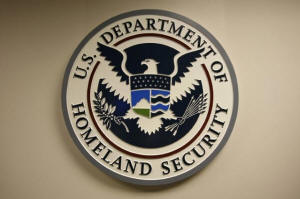|
U.S. government narrows focus of
counter-extremism program
 Send a link to a friend
Send a link to a friend
 [June 24, 2017]
By Julia Harte and Dustin Volz [June 24, 2017]
By Julia Harte and Dustin Volz
WASHINGTON (Reuters) - The U.S. Department
of Homeland Security on Friday announced changes to a $10 million
government grant program, narrowing its focus around efforts to combat
Islamist extremism.
In an update to awards announced in January by former President Barack
Obama's administration, the department released a new list of grant
recipients and amounts, shifting money to law enforcement offices and
away from groups that combat U.S.-based extremism.
Reuters reported in February that President Donald Trump's
administration wanted to revamp the program to focus solely on Islamist
extremism.
A DHS spokeswoman said the department changed the grant criteria after
the release of the initial list to consider whether applicants would
partner with law enforcement, had experience implementing
counter-extremism prevention programs, and would be able to continue
after the awards were spent.
"Top-scoring applications that were consistent with these priorities
remained as awardees, while others did not," said DHS spokeswoman Lucy
Martinez.

Three local law enforcement offices in California, Washington state and
Minnesota were among the new awardees, receiving grants totaling $1.2
million.
A spokesman for the Alameda County Sheriff's Office in California said
it would use the money to address extremism "on all fronts," not just
Islamist violence. Sergeant Ray Kelly cited violent clashes between
right-wing and left-wing demonstrators that recently erupted in the city
of Berkeley as an example of local extremism in the county.
Kelly said the office would use the grant money to train officers to
better recognize and address signs of alienation that make young people
vulnerable to extremism, with the help of behavioral health counselors
who are already on staff.
[to top of second column] |

U.S. Department of
Homeland Security emblem is pictured at the National Cybersecurity &
Communications Integration Center (NCCIC) located just outside
Washington in Arlington, Virginia September 24, 2010.
REUTERS/Hyungwon Kang

The Muslim Public Affairs Council, a nonprofit group that works to
improve public understanding and policies that affect American
Muslims, said the Trump administration revoked its nearly $400,000
grant because the group "did not meet the criteria of working with
law enforcement to counter violent extremism."
The revised list also omitted several original awardees focused on
U.S.-based extremism, such as Life After Hate, which tries to steer
young people away from far-right extremism.
Christian Picciolini, a co-founder of Life After Hate, told Reuters
his group was planning to use its $400,000 grant to scale up its
counselor network of former extremists to "meet the highly increased
requests for our services since Election Day."
"The current administration's lack of focus on domestic white
extremist terrorism, let alone its denial to even acknowledge it
exists, is highly troubling," Picciolini wrote in an email.
(Reporting by Julia Harte and Dustin Volz; Editing by Bill Rigby and
Bill Trott)
[© 2017 Thomson Reuters. All rights
reserved.]
Copyright 2017 Reuters. All rights reserved. This material may not be published,
broadcast, rewritten or redistributed.
 |